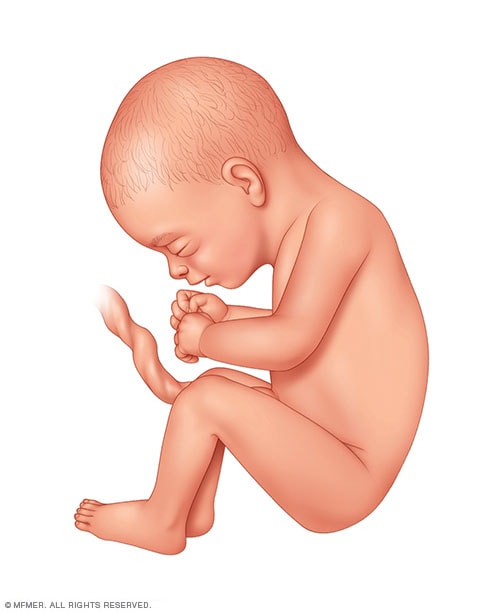$name
During these last couple of months, your baby is working on the finishing touches — the remaining steps that need to occur before he or she is fully developed.
With the major body systems in place, your baby is now gaining weight more quickly. As space becomes tighter, you may not feel the baby's sharp jabs and punches as much as you did earlier.
Baby is also developing a sleep and wake cycle. During periods of sleep, baby will be quiet.
$name

$name
As baby gains weight, he or she is also adding layers of fat. From now until delivery, baby will gain about a half-pound a week. Baby may also begin practicing breathing movements this week by moving his or her diaphragm in a repeating rhythm. These movements may give your baby the hiccups. You may occasionally notice the hiccups as a slight twitching in your uterus. It may feel like little spasms.
At 30 weeks into your pregnancy, your baby weighs a little over 3 pounds and is about 10 1/2 inches long, crown to rump.
During week 31, baby's reproductive system continues to develop. If your baby is a boy, his testicles are moving from their location near the kidneys through the groin on their way into the scrotum. If your baby is a girl, her clitoris is now relatively prominent. The labia are still small, though, and don't yet cover it.
Your baby's lungs are now more developed, but they're not yet fully ready for life outside. If you go into preterm labor this early, or up to three weeks before your baby's estimated due date, your care provider will likely give you a steroid injection to help baby's lungs mature. Babies that are born this week will still need care in a neonatal intensive care unit.
Lanugo, the layer of soft, downy hair on your baby's skin, starts to fall off this week. Baby will lose most of his or her lanugo over the next few weeks. Right after your baby's birth, you may see some remnants on his or her shoulders or back.
Some women may notice a change in baby's movements this week, now that he or she has grown to the point of being crowded inside your uterus. Although your baby is moving around just as much, kicks and other movements may seem less forceful. For many women, this change becomes more apparent about week 34.
You may want to check on your baby's movements from time to time, especially if you think you've noticed decreased activity. To do this, sit down and keep a tally of how often you feel your baby move. Your baby's kicks or movements may seem a little muffled, given the space constraints inside your uterus. If you notice fewer than 10 movements in two hours, contact your care provider.
By 32 weeks, your baby weighs about 4 pounds and is almost 11 1/2 inches long, crown to rump. If you delivered at this point, the risk of your baby developing life-threatening complications would be much lower than in earlier weeks.